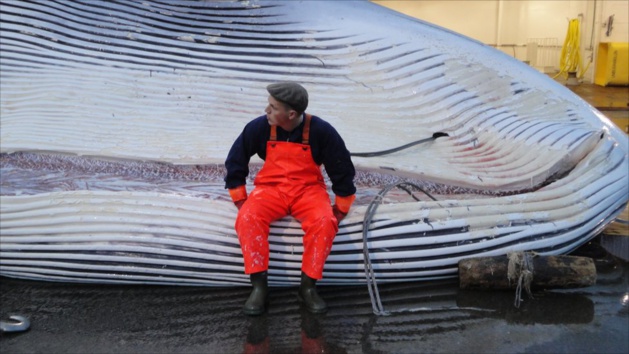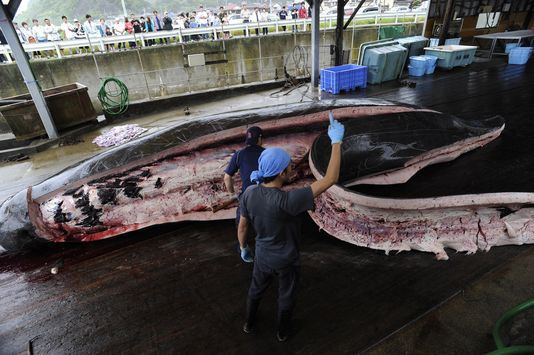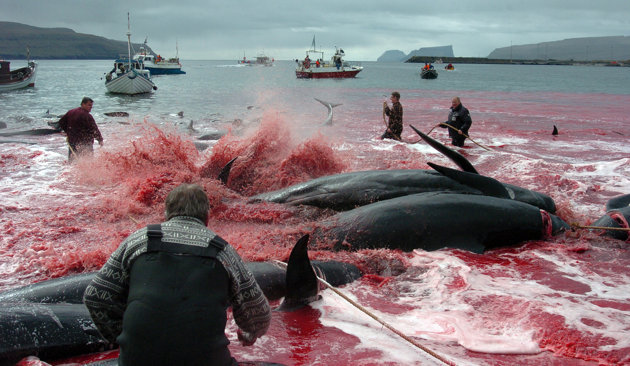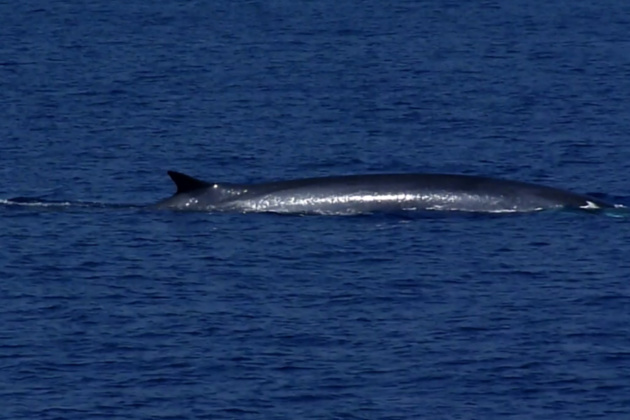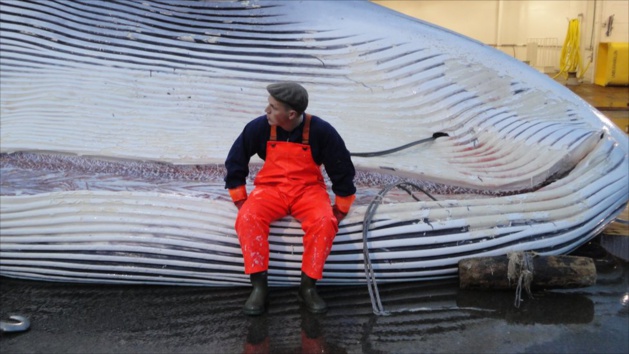
Credits: BBC News Europe
At the beginning of July, Iceland launched its new summer season of whaling. After stopping the hunt for 14 years, the volcanic island restarted the practice in 2006. In spite of the protests and the petitions, which erupted this year, the country chose to boost hunting. There were 800,000 signatures against the restart of hunting for 2015; a significant figure when we know that Iceland has approximately 323,000 inhabitants. The petition grew outside their borders, although it did not prevent hundreds of tons of whale meat from being exported. In 2014, Icelandic whalers killed 24 minke whales and 134 common rorquals.
Rules and opponents
More than a thousand years ago, fishermen were already attacking the giants of the seas. But, at the time, these giants could terrify the sailors by their power and their gigantic size. Today, the ships of the hunters are protected against the eventual waves caused by the cetaceans. Harpoons can defeat the skin of the animal. The practice is thus becoming easier and lasts.
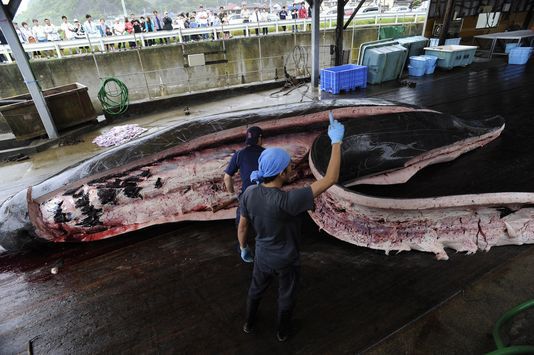
The International Whaling Commission (IWC), in charge of regulating the hunt, has banned commercial whale hunting ever since the eighties and the adoption of a text. Thus, all countries should, by principle, respect this rule, but since it is not an international law all countries do no not recognize it. Iceland and Norway did not ratify the moratorium of 1986 forbidding commercial hunting of the cetacean. “They are not breaking the law. The resolutions of the IWC are not compulsory for states which remains sovereign. It is the same way of functioning as the UN,” Denis Ody tells Le Journal International, in charge of the ocean team in WWF,. As for Japan, it has been banned from hunting in the Antarctic this season. The country has published a report aiming to show that hunting has no commercial reach but a scientific objective. The Japanese state has pointed out that it wants to improve the knowledge of the marine ecosystem of the Antarctic, and that fishing is thus necessary for the analysis. A “pretext” according to Denis Ody. “ Most of these scientific campaigns have shown few or no results at all”.
Japan remains one of the main buyers of whale steak. In last June, an Icelandic ship left the port of Hafnarfjördur to reach the Japanese coasts, with 1700 tons of whale meat on board. In total, 25,000 whales may have been slaughtered by these three countries ever since the enforcement of the ban on commercial hunt, according to the numbers of the NGO Sea Shepherd.
Not a promising growth sector
We could think that if these countries continue to hunt it is because of economic benefits, but that is not the case. Whale sales have been dropping over the last few years. In Iceland, whale watching tourism generates millions of dollars every year. Harpooning these animals can be linked to the metaphor of throwing a spike in the foot of the economy of the country. Yet, tourists represent the major part of people tasting whale meat. In Iceland and in Norway they represent an important part of the local demand.
In this way, they contribute to the continuation of the hunting in these two countries. Locally, the Norwegians and the Icelandic are consuming less and less whale meat; they are not so fond of this meat and it is not recommended for children because it contains heavy metals. Charlotte Nithart, spokesperson of the environmental association Robin Hood informs us “The contents in heavy metals and in pollutants, in the meat and in the fats, can provoke serious illnesses when consumed regularly”. For the Icelandic people, the government gives subventions for the hunt, helping the whalers with their facilities and fishing material. In the land of the rising sun, the stock of whale meat even reached its lowest rate in fifteen years, from 1157 tons. “The meat stock builds up but is never consumed,” Denis Ody tells us.
The drop in consumption is spreading. So, why keep hunting? The arguments of the nations involved are divergent and are not always rational. ”Norway and Iceland have an important whale hunting past as well as other marine mammals such as seals. They also have a big exclusive economic zone in the sea. They consider, and so does Japan, that giving up whale hunting and giving in to international pressure would lead them to concede other things in the fishing sector. Whale hunting is an affirmation of their sovereignty” Charlotte Nithart states. As for Denis Ody, there simply is “no reason to continue this hunt. It is only a purely diplomatic game. In the IWC, the US has the same impact as a small country. It is probably a way for them to show that they exist on the international scene. There is no economical stake”.
In the end, cultural traditions are put forward. « There is a certain habit, declining but still anchored, to eat mammal meat and to use other parts of the animals for the clothes and domestic utilisation”. Whale hunting is for them a sort of patriotic need to honour the elders. In Iceland, cooking whales would honour the old Viking cuisine. Some storekeepers even developed a whale flavoured beer, which, according to them, would transform the consumer into a “real Viking” because he would reconnect with his old roots. The Icelandic government assures that this fishing is sustainable and that it does not threaten the species.
Food Fishery
Greenland, Alaska, Saint Vincent and the Grenadines, the Faroe islands or the region of Tchoulotka in Siberia all practice food fishery. In other words, they have regulated and tolerated quotas to hunt whales because it is a part of their cultural heritage, their local tradition and common heritage. « These are permits delivered to population with a traditional lifestyle. On the principle, if everything is respected and there is no excess, why not? » explains Denis Ody. Thus food fishery is granted to the people still living in the cultural and traditional way and without which their needs would not be fulfilled. Aboriginal hunting, just like scientifically hunting is accepted by the IWC. Other countries remain quite impenetrable on their wills and practices. Indonesia, for example, is still practising whale hunting, particularly on the island of Lembata. There, it is an entertainment and an old practice.
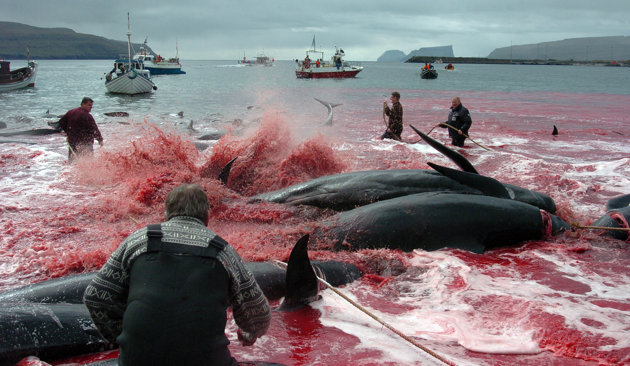
In the Philippines, retractor country of the International Convention for the regulation of whale hunting, whale hunting lasts without any numbered data being broadcasted. Sometimes in secret ways, often in violent ways, the Philippine fishermen do not hesitate to use explosives to fill their nets. This practice is forbidden by Manila but it still persists in the country. On the Faroe Islands, food fishery has turned into an annual slaughter. It is the « grindadràp » or the « killing of whales » in Faroese.
Whales contributes to marine balance
Even though they are protected, common rorquals –marine mammals amongst the most fished by the whalers – are endangered. They suffer attacks from whalers and their population is endangered. All the ships sailing close to their habitation zone, the fishing nets, the decrease of their preys because of overfishing and the sonars are also part of the difficulties that the species has to face during mating time.
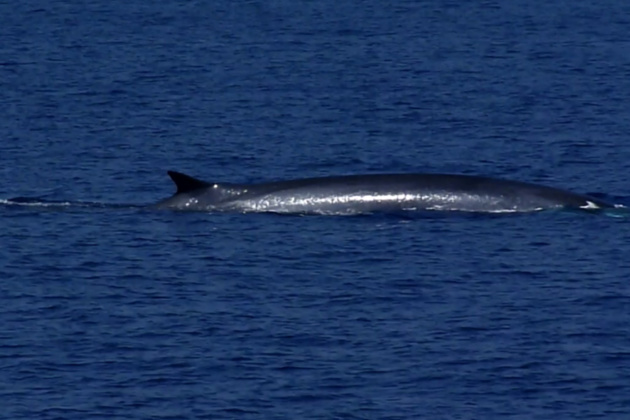
Whales are particularly useful to the well being of the eco system of the oceans. « Some species of whales furrow the ocean floor in search of preys such as worms or crustaceans » explains Charlotte Nithart. Whale carcasses serve as habitation and nutriments to other species living on the ocean floor. They also contribute to the good development of the underwater nature. When a whale dies, it sinks and brings a high quantity of organic carbon, due to the fact that it washes up on the ocean floor. Whales recycle nutriments and its faecal rejects aids the growth of plankton. « Whales are plankton breeders » she assures. Their excrements also help absorb carbon dioxide. The whale also has beneficial capacities for ecology. « From the cradle to the grave, the cycle of life of whales is useful to the common good. » concludes Charlotte Nithart.
Deep-sea fishing is an expression that illustrates whale hunting. Here, the deep-sea animals are weak and less and less present within the seas and oceans. They hold an important place in the oceans but also in the economy of the whaling countries. Nevertheless, the most significant loss is in the animal beauty, biodiversity and the balance of marine oceans.














